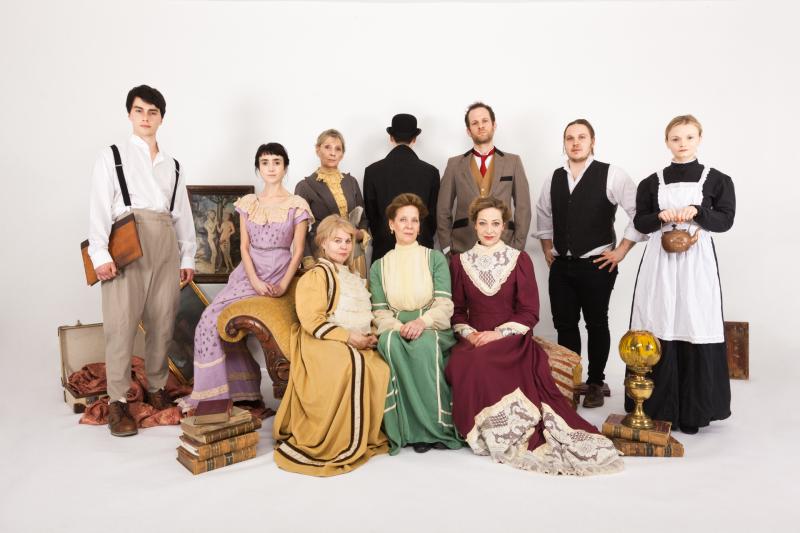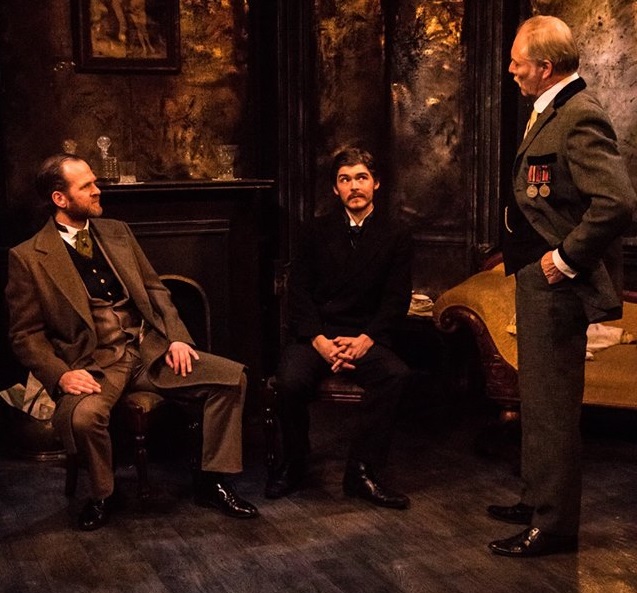The Passing of the Third Floor Back, Finborough Theatre review - the better nature of Jerome K Jerome | reviews, news & interviews
The Passing of the Third Floor Back, Finborough Theatre review - the better nature of Jerome K Jerome
The Passing of the Third Floor Back, Finborough Theatre review - the better nature of Jerome K Jerome
Edwardian rediscovery verges towards the sentimental, but satisfyingly so

Even by the standards of theatrical archaeology that the Finborough has made its own, The Passing of the Third Floor Back is a curiosity. Jerome K Jerome’s 1908 play was a long-running hit in the West End – with Johnston Forbes-Robertson, one of the leading English classical actors of his day, in the lead – before transferring to Broadway for a year.
Instead Jerome charts a determined course from comedy of a rather bitter kind, through a surprising but theatrically effective development device, to a final redemption that must have sent his Edwardian viewers out into the night on a gust of moral uplift. We may wonder if its overtly Christian overtones might have seemed even then a little passé: it’s the darker first half that stands up more strongly today. A faint whiff of Wilde seems occasionally to hang in the air, and the piece’s contrasting moods are caught rather neatly by one of that wit’s adages, that sentimentality is the bank holiday of cynicism.
 The contrast is there in the character descriptions that Jerome added to his Prologue-Play-Epilogue structure. The setting throughout is the front room of a Bloomsbury boarding house – “Third Floor Back” is the worst room, the one most difficult to let – presided over by its landlady, Mrs Sharpe (Anna Mottram). Going from “A Cheat” in the prologue to “The Lady of the House” for the epilogue, she oversees a guest list that includes, among other choice single-word put-downs, a hussy, snob, cad, rogue and slut. Her own moniker is earned by her propensity to cook the bills as much as the menus (“the milk will bear a little more water” is a lovely line, all the better for being delivered with a frisson of Downton’s Isobel Crawley).
The contrast is there in the character descriptions that Jerome added to his Prologue-Play-Epilogue structure. The setting throughout is the front room of a Bloomsbury boarding house – “Third Floor Back” is the worst room, the one most difficult to let – presided over by its landlady, Mrs Sharpe (Anna Mottram). Going from “A Cheat” in the prologue to “The Lady of the House” for the epilogue, she oversees a guest list that includes, among other choice single-word put-downs, a hussy, snob, cad, rogue and slut. Her own moniker is earned by her propensity to cook the bills as much as the menus (“the milk will bear a little more water” is a lovely line, all the better for being delivered with a frisson of Downton’s Isobel Crawley).
That’s just one of the many rooming-house ruses around, all distinctly dodgy by moral, if not actually legal standards. It’s a world in which poverty, however much it’s dressed up in the vestiges of gentility, hovers (Jerome himself knew it well from his early working life, not least from his time in a down-at-heel theatrical troupe). There’s an impecunious major (Graham Pountney, pictured above, right), desperate to marry off his daughter to the only one in the company with a hint of money, however tainted, though she loves a proverbial penniless artist. The city gentleman is far from such for all his Scottish gab, complete with “jackal” side-kick to ease his plans along. The distaff company is stronger still, from a nobility name-dropping snob (Carmen Rodrigues) to the perennially “unattached” Miss Kite (Paddy Nevin), whose lavish rouge fails to disguise the advancing years that she fibs about.
Just when we think we are going to be watching this company stew in its bilious juices for the duration, enter the mysterious stranger… Alexander Knox’s character is the classic interloper who sets about bouleversing the world he has moved into (the first impression he makes on Mrs Sharpe has her beating her own rates down, rather than up: pictured below, Anna Mottram, Alexander Knox). It’s a familiar plot trope, but we’re used to the outsider who wreaks havoc (Pasolini’s Teorema, inter alia), rather than the antipode. But the reverse process has its fascination, as this “knight of better intention” performs his strange and transforming “drawing-room miracle”.
 There’s an almost detective quality to his ability to convince each character that he has known them before – “Who are you? I know your voice. I hear it in the wind” – in their better days, and to convince them that they have a better nature to recapture, along with a simple empathetic regard for one another. The Passing of the Third Floor Back runs, with interval, at a shade over two hours, so the device does not overstay its welcome. I wasn’t entirely convinced that Alexander Knox has yet caught the transfixing simplicity that his character needs to convince the audience as much as Jerome’s cast of his Christ-like higher nature (interesting that Forbes-Robertson, otherwise acclaimed as one of the great Victorian Hamlets, was 55 when he played the role: he reprised it a decade later in a silent film). But, like the bursts of sunlight that periodically shine into this otherwise dowdy world, the belief he embodies – that all could be otherwise, that you can choose self-respect over self-interest – convinces, occasionally rather movingly.
There’s an almost detective quality to his ability to convince each character that he has known them before – “Who are you? I know your voice. I hear it in the wind” – in their better days, and to convince them that they have a better nature to recapture, along with a simple empathetic regard for one another. The Passing of the Third Floor Back runs, with interval, at a shade over two hours, so the device does not overstay its welcome. I wasn’t entirely convinced that Alexander Knox has yet caught the transfixing simplicity that his character needs to convince the audience as much as Jerome’s cast of his Christ-like higher nature (interesting that Forbes-Robertson, otherwise acclaimed as one of the great Victorian Hamlets, was 55 when he played the role: he reprised it a decade later in a silent film). But, like the bursts of sunlight that periodically shine into this otherwise dowdy world, the belief he embodies – that all could be otherwise, that you can choose self-respect over self-interest – convinces, occasionally rather movingly.
Jonny Kelly’s production for NorthSee Theatre is very satisfying, his cast of 12 playing fluently together in a lovely set by Jasmine Swan, all burnished metal. Jerome’s text seems somehow very fluent too, rolling along very naturally, and Lizzie Faber’s harp accompaniment, singing almost like a score in itself, is a touch of genius, the melodic enticement that does convince us to suspend our disbelief.
Add comment
The future of Arts Journalism
You can stop theartsdesk.com closing!
We urgently need financing to survive. Our fundraising drive has thus far raised £49,000 but we need to reach £100,000 or we will be forced to close. Please contribute here: https://gofund.me/c3f6033d
And if you can forward this information to anyone who might assist, we’d be grateful.

Subscribe to theartsdesk.com
Thank you for continuing to read our work on theartsdesk.com. For unlimited access to every article in its entirety, including our archive of more than 15,000 pieces, we're asking for £5 per month or £40 per year. We feel it's a very good deal, and hope you do too.
To take a subscription now simply click here.
And if you're looking for that extra gift for a friend or family member, why not treat them to a theartsdesk.com gift subscription?
more Theatre
 The Gathered Leaves, Park Theatre review - dated script lifted by nuanced characterisation
The actors skilfully evoke the claustrophobia of family members trying to fake togetherness
The Gathered Leaves, Park Theatre review - dated script lifted by nuanced characterisation
The actors skilfully evoke the claustrophobia of family members trying to fake togetherness
 As You Like It: A Radical Retelling, Edinburgh International Festival 2025 review - breathtakingly audacious, deeply shocking
A cunning ruse leaves audiences facing their own privilege and complicity in Cliff Cardinal's bold theatrical creation
As You Like It: A Radical Retelling, Edinburgh International Festival 2025 review - breathtakingly audacious, deeply shocking
A cunning ruse leaves audiences facing their own privilege and complicity in Cliff Cardinal's bold theatrical creation
 Edinburgh Fringe 2025 reviews: Refuse / Terry's / Sugar
A Ukrainian bin man, an unseen used car dealer and every daddy's dream twink in three contrasting Fringe shows
Edinburgh Fringe 2025 reviews: Refuse / Terry's / Sugar
A Ukrainian bin man, an unseen used car dealer and every daddy's dream twink in three contrasting Fringe shows
 Faustus in Africa!, Edinburgh International Festival 2025 review - deeply flawed
Bringing the Faust legend to comment on colonialism produces bewildering results
Faustus in Africa!, Edinburgh International Festival 2025 review - deeply flawed
Bringing the Faust legend to comment on colonialism produces bewildering results
 Edinburgh Fringe 2025 reviews: Imprints / Courier
A slippery show about memory and a rug-pulling Deliveroo comedy in the latest from the Edinburgh Fringe
Edinburgh Fringe 2025 reviews: Imprints / Courier
A slippery show about memory and a rug-pulling Deliveroo comedy in the latest from the Edinburgh Fringe
 Edinburgh Fringe 2025 reviews: The Ode Islands / Delusions and Grandeur / Shame Show
Experimental digital performance art, classical insights and gay shame in three strong Fringe shows
Edinburgh Fringe 2025 reviews: The Ode Islands / Delusions and Grandeur / Shame Show
Experimental digital performance art, classical insights and gay shame in three strong Fringe shows
 Edinburgh Fringe 2025 reviews: Ordinary Decent Criminal / Insiders
Two dramas on prison life offer contrasting perspectives but a similar sense of compassion
Edinburgh Fringe 2025 reviews: Ordinary Decent Criminal / Insiders
Two dramas on prison life offer contrasting perspectives but a similar sense of compassion
 Edinburgh Fringe 2025 reviews: Kinder / Shunga Alert / Clean Your Plate!
From drag to Japanese erotica via a French cookery show, three of the Fringe's more unusual offerings
Edinburgh Fringe 2025 reviews: Kinder / Shunga Alert / Clean Your Plate!
From drag to Japanese erotica via a French cookery show, three of the Fringe's more unusual offerings
 The Two Gentlemen of Verona, RSC, Stratford review - not quite the intended gateway drug to Shakespeare
Shakespeare trying out lots of ideas that were to bear fruit in the future
The Two Gentlemen of Verona, RSC, Stratford review - not quite the intended gateway drug to Shakespeare
Shakespeare trying out lots of ideas that were to bear fruit in the future
 Edinburgh Fringe 2025 reviews: The Horse of Jenin / Nowhere
Two powerful shows consider the Israeli-Palestinian conflict, with mixed results
Edinburgh Fringe 2025 reviews: The Horse of Jenin / Nowhere
Two powerful shows consider the Israeli-Palestinian conflict, with mixed results
 Edinburgh Fringe 2025 reviews: The Fit Prince / Undersigned
A joyful gay romance and an intimate one-to-one encounter in two strong Fringe shows
Edinburgh Fringe 2025 reviews: The Fit Prince / Undersigned
A joyful gay romance and an intimate one-to-one encounter in two strong Fringe shows
 Tom at the Farm, Edinburgh Fringe 2025 review - desire and disgust
A visually stunning stage re-adaptation of a recent gay classic plunges the audience into blood and earth
Tom at the Farm, Edinburgh Fringe 2025 review - desire and disgust
A visually stunning stage re-adaptation of a recent gay classic plunges the audience into blood and earth

Comments
Caught this night and found